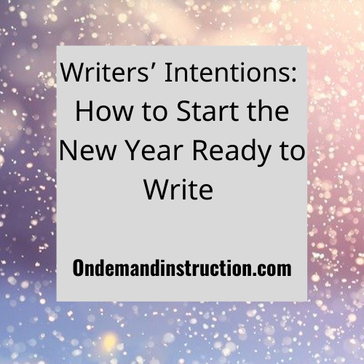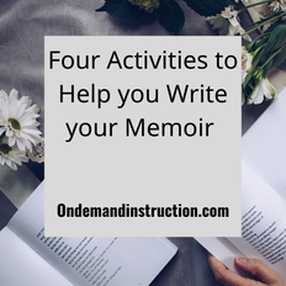 No matter what type of writing you do: memoir, short story, poetry, or novels, there are times when your creative energy wanes. Sometimes, you fall off track and lose the plot of your story. Sometimes, life gets the better of you, and there’s no time to write. And sometimes, your energy just runs out. When your tanks run low, taking a moment to reset your intentions can support your writing practice. At some point in your life, you have probably set resolutions for the new year. Perhaps you wanted to lose weight, eat healthier, be more productive, or find your true love. Whatever your goal was, setting a new year’s resolution is one way that people take a moment to put into words the goal they want to achieve. Why Resolutions Don’t Always Work Unfortunately, if your resolution didn’t stick for very long, you are not alone. For most of us, stating a resolution doesn’t put us on the path to achieving our goals. And for many of us, the resolution itself may be the issue. When you set a resolution, you accept a viewpoint that we aren’t doing enough, aren’t good enough, or aren’t worthy. A resolution tends to be focused on the problem rather than the solution. A resolution can presuppose that a major change is needed for us to move forward, and that thinking can be a negative for some people and may lead to the resolution’s failure. What is an Intention? An intention is the act of setting a goal that is more focused on the journey toward the goal. An intention tends to be focused on the solution rather than on the problem. Writers are natural planners. Since you plan a story, a poem, or a novel before sitting down to write, creating a plan to meet your goal is a similar process. Once you set your goal, making it to the end result is a process you have been through many times. Example of a Writers’ Intentions for the New Year I received an email today from a writer I worked with earlier in the year. She sent a year-at-a-glance message to people connected with her work. In her message, she outlined projects that invigorated her and projects that drained her. She listed her plans for the new year: start a new book, write more blog posts, get two articles published before summer, and attend an upcoming writer’s workshop. Nowhere in her message did she indicate that she needed to make a major change to her writing life, rather she outlined the small adjustments that she intends to drive her writing career to its next level. She emailed a bulleted list with a few things she intends to do this year with her writing. Simple. Set Your Intentions to Write Think of one writing goal that you would like to accomplish. A small goal is a good one, because you can achieve it in a shorter time period and be able to move onto another, larger goal later. Once you have your goal in mind, what is a reasonable period of time needed to accomplish it? What resources, tools, or material do you need to accomplish this goal? If you need to get things in order to accomplish this goal, do that first, then start into your plan and achieve your goal. Writing Can Be Hard Work but It Is Worth the Effort Sometimes, writing is easy. You sit down with a hot cup of coffee and the words magically flow from your fingers as though you tapped into a creative stream in the universe. Other times, you may feel distracted, overwhelmed, or discouraged. These experiences happen to all writers, so try to be kind to yourself when in a low point with your writing. Give yourself a break and set an intention to move your writing forward. Writing can be hard work, but it is worth the effort when you see your words on the page. Related Blog Posts
Comments are closed.
|
About the SiteWelcome, Writers! Archives
September 2023
|






 RSS Feed
RSS Feed